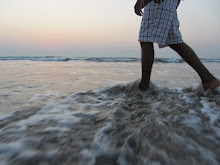A celebration of culture can never be complete without cuisine. Who else but the poster-boy of Indian cookery could be the best person to flag-off the newly introduced Cookery Contest at Saarang? The chef extraordinaire was here yesterday afternoon to present a list of 30 things to eat before you die. A delay of 2 hours only increased the appetite of the audience but what came afterwards was well worth the wait.
Sanjeev started-off the lecture by talking about himself and his pursuit of a rather unconventional profession. Then he proceeded to present his comprehensive list, at some times informative and at others nostalgic. The anecdotes and jokes meticulously inserted in his presentation convinced each one of us why he is regarded as one of the most sought after television personalities as well. The lecture finished at a high point after a series of interesting question-and-answer exchanges with a visibly enthusiastic audience. This was followed by an exclusive interview with the Newsletter correspondents.
Correspondent: The term which comes immediately in our minds when we think of Sanjeev Kapoor is Khana-Khazana. How did Khana-Khazana happen?
Sanjeev: It all began at a point of time when satellite television was new in India. Different chefs were being approached for launching an interactive cookery show. Zee TV approached me with a name Srimaan Bawarchi, to which I immediately responded with a ‘No’. This was when I had reached the peak of my professional career albeit at a very early age of 28.
C. After the success of the show, many other cookery shows also poured in. But they did not enjoy as much adulation as your show, which has been on air for 15 years. What is the secret behind the longevity of Khana Khazana?
S. Khana Khazana is a complete package. With the extensive research carried out by us, we have a better understanding of the interests of the viewers. The core value being - cooking what viewers can replicate. Explaining the recipe in detail yet keeping the format simple enough to not look boring is what makes us connect with the audience. After every show, we make it a point to think from the viewer’s perspective.
C. What does it take to become a world-class chef? Is it only exceptional cooking skills or do presentation and soft skills take the cake?
S. Soft skills are equally important. If you cook well, you might be a brilliant cook but it takes beyond just cooking to make a chef. Not only the art and the science of cooking but the management of cooking is also what a chef needs to excel in.
C. How do you manage to come-up with numerous new recipes? Do you keep on experimenting with the ingredients while you are cooking, just like a scientist?
S. (Smiles) Being familiar with (the) ingredients lets you make predictions in your mind. For example, you know that adding sugar to a dish will make it sweet. The variations, therefore, are never startling. Although, most of it depends on instincts.
C. The success of pizza and noodles in Indian food market is quite palpable. Are the Indian food-items equally successful in western countries?
S. Yes, of course. Indian food is no 1 in UK. Chicken Tikka Masala is the national dish in England. Our spices and flavours are extensively used by western cooks to spice-up their dishes.
C. What is the secret behind the success of the Indian curry?
S. Indian curry has a unique blend (of spices). In our curries, we use 10-15-20 different herbs and spices. It’s more like a modern day doctor who recommends 7-8 medicines with a hope that something will work. (Similarly,) Something out of that magic blend works.
C. Even though cooking is women’s forte in Indian households, why do you think men still make better chefs?
S. Men are not more successful but more in numbers. Cooking as a profession is physical and laborious in nature. Women are also expected to look after household. A father can work. It’s more to do with the social structure.
C. We all know that you pursued a hotel management course not in vogue despite being an academically brilliant student because you wanted to do something different and bizarre. Given your famous love for the bizarre, what are the other interesting activities that you enjoy?
S. Learning new skills always interests me. I agreed to judge Jhalak Dikhlaja because it was very different. I’ve also been a percussionist and used to play for a band.
C. Thank you very much. It’s been a pleasure meeting you.
S. The pleasure is all mine!
The lecture was followed by an innovative contest which lacked fire and was doing away with hot & cold water instead. Thanks to the creative cooking of the contestants, with utter modesty, the event went ahead of the ‘30 things to eat before you die’ to ‘30 things to eat in order to die’. Apparently, the teams started making crazy concoctions of the eatables lying on the tables to create something so intriguing that the judge reacted with “Please take me home early”. The workshop ended on a tit-for-tat note when the event organizer was forced to drink the winning potion and the judge who had tasted it stood flashing a contented smile.




No comments:
Post a Comment